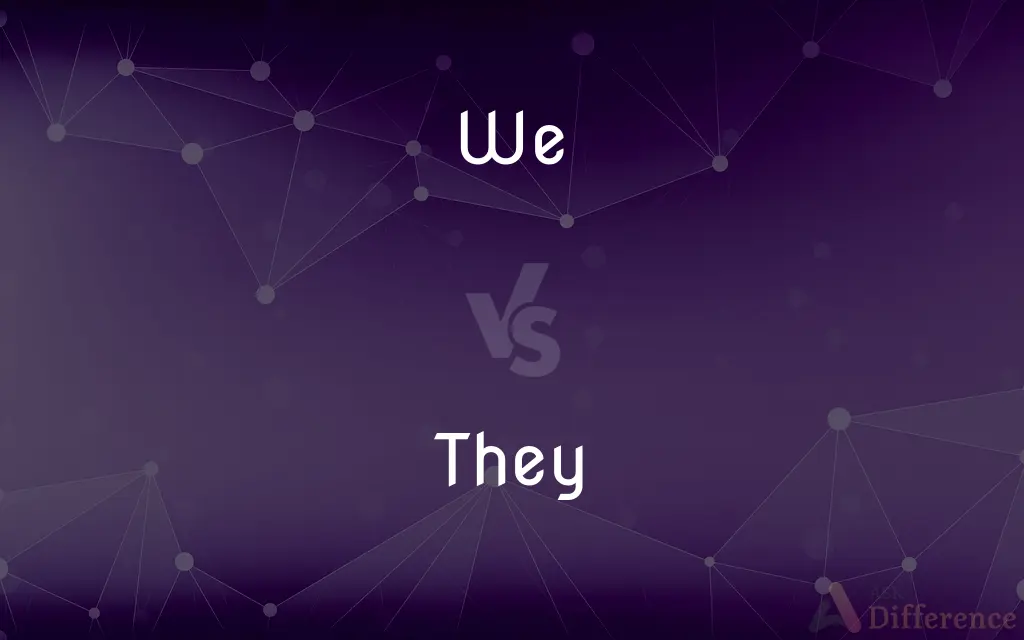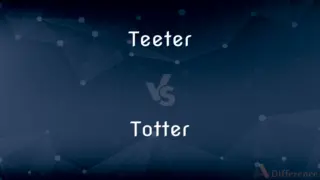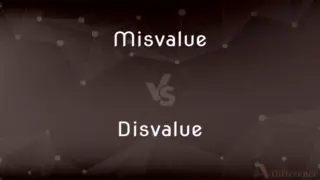We vs. They — What's the Difference?
Edited by Tayyaba Rehman — By Maham Liaqat — Updated on March 24, 2024
"We" is a first-person plural pronoun used to refer to speaker and one or more others, emphasizing inclusion. "They" is a third-person plural pronoun referring to a group of people or things, distinct from the speaker and listener, highlighting exclusion.

Difference Between We and They
Table of Contents
ADVERTISEMENT
Key Differences
"We" creates a sense of unity and inclusion, involving the speaker and at least one other person in the action or situation described. This pronoun is often used to foster a collective identity or shared responsibility. In contrast, "they" distinguishes a separate group of individuals or objects, not including the speaker or the listener, thereby emphasizing a distinction or separation between 'us' and 'others'.
In narratives or discussions, "we" can signify a group's collective perspective or action, such as a team working towards a common goal. On the other hand, "they" might be used to describe another group's actions, perspectives, or characteristics, often highlighting differences or distancing the speaker's group from the other.
The use of "we" can also imply a sense of shared experience or commonality, inviting listeners to identify with the speaker's point of view or group. Conversely, "they" can sometimes carry implications of otherness or exclusion, depending on the context and tone in which it's used.
Inclusive language like "we" is pivotal in speeches, advertising, and leadership communication, aiming to build rapport and collective identity. Meanwhile, "they" can be useful for clarity in distinguishing between different groups or parties in a discussion, narrative, or analysis.
Cultural and contextual nuances greatly influence the use of "we" and "they," with "we" sometimes used even when the speaker is not part of the referred group, known as the 'royal we' or an 'editorial we'. Similarly, "they" has evolved to also serve as a singular pronoun for individuals who prefer gender-neutral language, expanding its traditional plural use to embrace inclusivity in a different dimension.
ADVERTISEMENT
Comparison Chart
Person
First-person plural
Third-person plural
Inclusion
Includes speaker and listener(s)
Excludes speaker and listener(s)
Purpose
To express unity or collective action
To differentiate or describe others
Implication
Shared identity or experience
Separation or distinction
Additional Uses
"Royal we," "editorial we"
Singular they for gender neutrality
Compare with Definitions
We
"We" refers to the speaker and one or more others collectively.
We are planning a trip this weekend.
They
"They" refers to a group distinct from the speaker and listener.
They won the championship last year.
We
It emphasizes group inclusion or shared action.
We need to finish the project by tomorrow.
They
It highlights separation or otherness.
They have a different approach to solving this problem.
We
"We" can denote an organization or team.
We aim to be the best in our industry.
They
It can denote groups in stories or explanations.
They left early to avoid the traffic.
We
It's used in the 'royal we' to denote authority or position.
We have decided to grant your request.
They
"They" is used for unspecified individuals.
They say it's going to rain tomorrow.
We
"We" fosters a sense of community or belonging.
Together, we can make a difference.
They
"They" is also a singular pronoun for gender neutrality.
Alex said they would join us later.
We
In Modern English, we is a plural, first-person pronoun.
They
In Modern English, they is a third-person pronoun.
We
(personal) The speakers/writers, or the speaker/writer and at least one other person (not the person being addressed). This is the exclusive we.
They
Used to refer to two or more people or things previously mentioned or easily identified
The two men could get life sentences if they are convicted
We
(personal) The speaker(s)/writer(s) and the person(s) being addressed. This is the inclusive we.
They
Used to refer to a person of unspecified gender
Ask a friend if they could help
We
(personal) The institution upon which the speaker/writer is acting. This is the editorial we, used by writers and others when speaking with the authority of their publication or organisation.
They
(the third-person plural nominative) A group of entities previously mentioned.
Fred and Jane? They just arrived.
Dogs may bark if they want to be fed.
Plants wilt if they are not watered.
I have a car and a truck, but they are both broken.
We
The sovereign alone in their capacity as monarch. This is the royal we. The reflexive case of this sense of we is ourself.
They
A single person, previously mentioned, but typically not if previously named and identified as male or female, especially if of unknown or (since 21st century) non-binary gender.
They requested a seat at Friday's performance but didn't say if they preferred the balcony or the floor.
If someone enters the restricted area, they are required to present identification.
We
(personal) The plural form of you, including everyone being addressed.
How are we all tonight?
They
(indefinite pronoun, vague meaning) People; some people; people in general; someone, excluding the speaker.
They say it’s a good place to live.
They didn’t have computers in the old days.
They should increase our wages.
Ha, you believe the moon is real? That's just what they want you to think.
We
(proscribed) The speaker or writer, used to imply connection between the speaker's experiences and a group of listeners.
Hey guys, how's it going? Today we are going to be playing a new game.
They
There especially as an expletive subject of be.
We
(Tyneside) Us.
They
The, those.
We
The speakers/writers, or the speaker/writer and at least one other person.
We Canadians like to think of ourselves as different.
They
Their.
We
The plural nominative case of the pronoun of the first person; the word with which a person in speaking or writing denotes a number or company of which he is one, as the subject of an action expressed by a verb.
They
The plural of he, she, or it. They is never used adjectively, but always as a pronoun proper, and sometimes refers to persons without an antecedent expressed.
Jolif and glad they went unto here [their] restAnd casten hem [them] full early for to sail.
They of Italy salute you.
Blessed are they which do hunger and thirst after righteousness.
Common Curiosities
When should "we" be used instead of "they"?
Use "we" when you want to include yourself and others in a group, and "they" when referring to an external group.
How does the use of "they" affect group dynamics?
Using "they" can highlight differences and create a sense of separation between groups.
Can "we" imply authority?
Yes, in contexts like the "royal we," it denotes authority or official position.
Is "we" always inclusive?
"We" is generally inclusive but can exclude others not identified as part of the speaker's group.
How can "we" be used to foster teamwork?
"We" fosters teamwork by emphasizing collective goals and shared responsibilities.
Why is it important to distinguish between "we" and "they"?
Distinguishing between "we" and "they" helps clarify whether the speaker is including or excluding themselves from the group being discussed.
How do "we" and "they" influence perspective?
"We" can create an insider perspective, while "they" establishes an outsider's viewpoint.
How does language evolve to include new uses of "they"?
Language evolves as society recognizes the need for more inclusive and flexible pronouns, leading to the expanded use of "they" for gender neutrality.
Is it appropriate to use "they" to refer to someone whose gender is unknown?
Yes, "they" is commonly used as a singular pronoun for someone whose gender is unknown or prefers not to be identified by traditional gender pronouns.
Can "we" be used manipulatively?
"We" can be used to manipulate by creating a false sense of inclusion or consensus.
Can the use of "they" be ambiguous?
Yes, "they" can be ambiguous, especially when it's unclear who the pronoun is referring to, or if it's being used in a singular or plural sense.
Can "they" be used for individuals?
Yes, "they" can be used as a singular pronoun for someone who prefers gender-neutral language.
How does "they" function in storytelling?
In storytelling, "they" can differentiate between the narrator or protagonists and other groups or characters.
What is the effect of using "we" in public speaking?
Using "we" in public speaking can create a connection with the audience and foster a sense of unity.
What role do cultural contexts play in the use of "we" and "they"?
Cultural contexts influence how "we" and "they" are used, affecting perceptions of inclusion, community, and otherness.
Share Your Discovery

Previous Comparison
Teeter vs. Totter
Next Comparison
Misvalue vs. DisvalueAuthor Spotlight
Written by
Maham LiaqatEdited by
Tayyaba RehmanTayyaba Rehman is a distinguished writer, currently serving as a primary contributor to askdifference.com. As a researcher in semantics and etymology, Tayyaba's passion for the complexity of languages and their distinctions has found a perfect home on the platform. Tayyaba delves into the intricacies of language, distinguishing between commonly confused words and phrases, thereby providing clarity for readers worldwide.














































